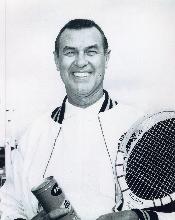
Eddie Cubbon
Stars of Yesterday: Eddie Cubbon
By Jim Joanos
If you are at all interested in the history of Florida State University's sports programs, one of the people that you should know about is Edward H. "Eddie" Cubbon. For 23 years, from 1954 until his death in 1977, he was a valuable "go to guy" for the Seminoles who performed a number of tasks, all exceptionally well, as an administrator, coach, teacher, and all round supporter.
 |
Eddie Cubbon |
In 1947, Florida State was restructured from a women's college into a coeducational university. A men's athletic program was begun and developed rapidly thereafter. By 1954, the program had begun to enter the world of big time collegiate sports. Athletic Director Howard Danford began looking for a new business manager to oversee the rapidly expanding business side of the program. He found a good one up in Charleston, West Virginia, in Eddie Cubbon.
Cubbon accepted the offer, and, therefore, for his first five years at FSU, Cubbon served as the Business Manager of Athletics. During that time, a lot was going on in FSU's athletics program as it moved forward and upward in college athletics. For example, it was during that time that the football team under head coach Tom Nugent played in its first major bowls, the Sun Bowl and the Bluegrass Bowl. It was also during that time that the FSU football team began playing Florida and several other major teams for the first times. In baseball, Danny Litwhiler became the head coach and took the team to the College World Series for the first time. The Men's Volleyball team won the national collegiate tournament. The track and field team also first became strong.
From 1959-1962, Cubbon took on a different challenge and served as FSU's Director of Development of the athletic program. In this job he helped to expand FSU's support base throughout Florida and elsewhere in the Southeast. Then for two years, he served successfully as the head coach of the Men's Varsity Tennis team. His 1962 team went 11-8 and his 1963 team was 16-5. Also in 1962, he began teaching courses on coaching as a member of the faculty of the Department of Physical Education. In 1963, he took over the Men's Intramural Sports program. He also administered the fledgling women's athletics program and helped it to advance while continuing his teaching. In 1964, he had a special assignment when he served as the advance man for the FSU Circus tour to Italy in conjunction with its appearance on the television show, "The Wild, Wild World of Sports." In 1967, he conducted some intramural training workshops at some United States military bases in Germany. In 1968, he played a very important role in the beginnings of the FSU Women's Intercollegiate Athletic program at FSU. He was especially helpful in securing funding for the women's program. In 1972-73, he again was a head coach, this time coaching the women's basketball team. Through the years, in addition to continuing his other administrative and teaching duties, he also served variously as an assistant coach in basketball, baseball, and swimming. For a number of years, he even supervised the physical education interns throughout the state. He was most important to FSU right up until his death at age 68 in 1977.
One of Cubbon's colleagues, Dr. Ken Miller, himself a very important pioneer in FSU athletics, once described Cubbon as an "impeccable dresser" with a "friendly smile which was recognized throughout much of the profession." Miller also wrote that: "No one at FSU did more to promote the acceptance of women's athletics than did Ed Cubbon."
Cubbon had accomplished a great deal even before coming to Tallahassee. He was born in West Virginia in 1909. Very athletic as a young man, he was an all state high school basketball player and was a basketball star at the University of West Virginia. Upon graduation he stayed at that university and coached the freshmen basketball team and the varsity tennis team for a year. Following that he stayed in Morgantown and took a job coaching all sports at the University High School in that city for six years. On the side, he continued his higher education and got a master's degree from UWV in 1935. From 1940-41, he completed all the class work required for a doctorate at Pennsylvania State University, but before he completed his dissertation he took a job as the Director of Athletics at California State Teachers' College where he also coached the basketball and baseball teams.
Soon after Cubbon's move to California, Japan bombed Pearl Harbor and the United States became engaged in World War II. Consequently, Cubbon became a Naval officer. He would rise to the rank of Lt. Commander. Along with his other naval duties involving the physical training of Navy pilots he coached various naval basketball and baseball teams. When the war ended, he went back to California State where he resumed his position as athletic director as well as basketball and baseball coach. He stayed there until he became the athletic director at Morris Harvey College (now known as College of Charleston) back in his home state of West Virginia where he ran that athletic program until 1954 when FSU came calling.
FSU's athltics program has been very fortunate to have had pioneers of the stature of Eddie Cubbon. Much of the success that is enjoyed today was made possible by their efforts. We are fortunate that they were there when they were needed.